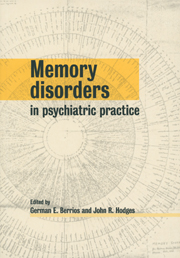Book contents
- Frontmatter
- Contents
- List of contributors
- Preface
- Part I
- Part II
- 6 The multidisciplinary memory clinic approach
- 7 The dementias
- 8 The amnesic syndrome
- 9 Transient global amnesia and transient epileptic amnesia
- 10 Insight into memory deficits
- 11 Memory in functional psychosis
- 12 Depressive pseudodementia
- 13 Practical management of memory problems
- Part III
- Notes
- Index
9 - Transient global amnesia and transient epileptic amnesia
from Part II
Published online by Cambridge University Press: 06 January 2010
- Frontmatter
- Contents
- List of contributors
- Preface
- Part I
- Part II
- 6 The multidisciplinary memory clinic approach
- 7 The dementias
- 8 The amnesic syndrome
- 9 Transient global amnesia and transient epileptic amnesia
- 10 Insight into memory deficits
- 11 Memory in functional psychosis
- 12 Depressive pseudodementia
- 13 Practical management of memory problems
- Part III
- Notes
- Index
Summary
Historical introduction
Fisher and Adams (1964) coined the term ‘transient global amnesia’ (TGA) to describe a syndrome which was reported independently by several authors in the 1950s (Bender, 1956; Guyotat & Courjon, 1956). This profound but temporary ‘defect of memory, involving the events of the recent past and the present’, had probably been classified previously as a manifestation of hysteria (Hodges, 1991). Once recognized, the syndrome proved highly distinctive and over 1500 cases have been described (Frederiks, 1993).
Many years before the delineation of TGA, Hughling-Jackson's classical description of the case of a physician with epilepsy, Dr Z., suggested that amnesia for episodes of complex and well-integrated behaviour can be a manifestation of temporal lobe epilepsy (TLE, Hughlings-Jackson, 1889). Fisher and Adams speculated that TGA might result from seizure activity disrupting ‘the recording and recall of recent events’. Subsequent research, outlined below, has shown that true TGA does not have an epileptic basis, but has also confirmed that epilepsy can cause a distinctive variety of transient amnesia. Numerous terms have been applied to episodes of epileptic amnesia including pure amnestic seizures (Palmini et al., 1992), ictal amnesia (Rowan, 1991), epileptic amnesic attacks (Pritchard et al., 1985; Galassi et al., 1986) and epileptic transient amnesia (Stracciari et al., 1990). The term suggested recently by Kapur, transient epileptic amnesia (TEA, Kapur, 1993), has been adopted, which highlights the similarity of this syndrome to, but also its distinction from, TGA.
In this chapter the clinical and neuropsychological features of TGA and TEA are reviewed and contrasted, their pathophysiology discussed and an approach to the management of patients with transient amnesia is outlined.
Keywords
Information
- Type
- Chapter
- Information
- Memory Disorders in Psychiatric Practice , pp. 187 - 203Publisher: Cambridge University PressPrint publication year: 2000
Accessibility standard: Unknown
Why this information is here
This section outlines the accessibility features of this content - including support for screen readers, full keyboard navigation and high-contrast display options. This may not be relevant for you.Accessibility Information
- 1
- Cited by
